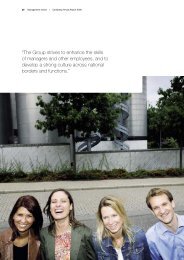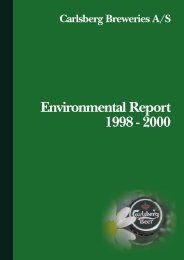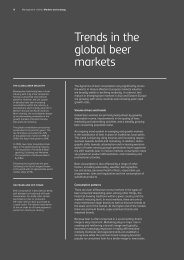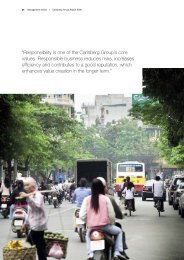Carlsberg Annual Report - Carlsberg Group
Carlsberg Annual Report - Carlsberg Group
Carlsberg Annual Report - Carlsberg Group
Create successful ePaper yourself
Turn your PDF publications into a flip-book with our unique Google optimized e-Paper software.
<strong>Carlsberg</strong> <strong>Annual</strong> <strong>Report</strong> 2011 39<br />
Chairman, Povl Krogsgaard-Larsen,<br />
Jess Søderberg and Kees van der Graaf).<br />
Richard Burrows, Jess Søderberg and<br />
Kees van der Graaf are independent of<br />
the Company as defined in the recommendations.<br />
The Committee held three<br />
meetings in 2011 and all members were<br />
present at all meetings except one meeting<br />
where one member was absent.<br />
The Remuneration Committee works<br />
according to Terms of Reference, which<br />
are reviewed and approved annually by<br />
the Supervisory Board and available<br />
on the Company’s website. In 2011, the<br />
Committee’s work included the review of<br />
short-term and long-term incentive plans<br />
in the Company, the appointment of an<br />
independent advisor to the Committee,<br />
a review of remuneration benchmarking<br />
data of relevant comparable companies,<br />
a review of remuneration trends and recommendation<br />
to the Supervisory Board<br />
with regard to Remuneration Policy and<br />
remuneration of the Executive Board.<br />
The Executive Board<br />
The Supervisory Board appoints the CEO<br />
and other members of the Executive Board.<br />
Led by the CEO, the Executive Board is<br />
responsible for the preparation and implementation<br />
of strategic plans. The Executive<br />
Board consists of two persons: Jørgen Buhl<br />
Rasmussen, President & CEO, and Jørn P.<br />
Jensen, CFO & Deputy CEO.<br />
The members of the Executive Board are<br />
not members of the Supervisory Board<br />
but attend Supervisory Board meetings.<br />
The Company also has a wider Executive<br />
Committee which consists of nine<br />
individuals in addition to the two Executive<br />
Board members. The composition of<br />
the Executive Committee can be seen on<br />
page 42.<br />
Remuneration<br />
The Executive Board<br />
In order to attract and retain managerial<br />
expertise, the remuneration of the<br />
members of the Executive Board and<br />
other senior executives is determined on<br />
the basis of the work they do, the value<br />
they create and conditions at comparable<br />
companies. The remuneration includes<br />
incentive programmes, which are to help<br />
align the interests of the Company’s<br />
management and shareholders as the<br />
programmes support both short-term<br />
and long-term goals.<br />
The remuneration of the Executive Board<br />
comprises salary, cash bonuses, sharebased<br />
payments and other usual benefits.<br />
The members take out their own pension<br />
plans.<br />
The remuneration of the Executive Board<br />
is presented in note 12 to the consolidated<br />
financial statements, which sets out the<br />
individual remuneration in 2011 of each<br />
Executive Board member. The Company’s<br />
Remuneration Policy for the Supervisory<br />
Board and the Executive Board, including<br />
general guidelines for incentive program mes<br />
for the Executive Board, were approved at<br />
the <strong>Annual</strong> General Meeting on 24 March<br />
2011. The policy and guidelines are available<br />
on <strong>Carlsberg</strong>’s website.<br />
Share option programmes exist for the<br />
<strong>Group</strong>’s Executive Board and other management<br />
personnel. The programmes entitle<br />
them to purchase B shares in <strong>Carlsberg</strong><br />
A/S between three and eight years<br />
after the options have been granted. The<br />
exercise price is the average market price<br />
during the first five days following the<br />
publication of the consolidated financial<br />
statements for the year. The number and<br />
value of share options granted and outstanding<br />
are presented in note 13 to the<br />
consolidated financial statements.<br />
The option programme is supplemented<br />
by performance-related bonus schemes<br />
covering a proportion of the <strong>Group</strong>’s<br />
salaried employees.<br />
The Executive Board does not receive a<br />
bonus on the completion of a takeover<br />
bid, but its terms of notice change.<br />
The Supervisory Board<br />
The general principles for the remuneration<br />
of the Supervisory Board are set out<br />
in the Remuneration Policy. The Policy<br />
and the specific remuneration to the<br />
Supervisory Board for 2011 were approved<br />
by the <strong>Annual</strong> General Meeting on 24<br />
March 2011. The remuneration consists of<br />
a fixed annual base fee (DKK 400,000<br />
for 2011). The Chairman receives double<br />
the base fee and the Deputy Chairman<br />
receives one-and-a-half times the base<br />
fee. A member of a Board committee receives<br />
an additional annual fee of 38% of<br />
the base fee. The Chairman of the Audit<br />
Committee receives an additional annual<br />
fee of 75% of the base fee, and the Chairman<br />
of the Remuneration Committee and<br />
the Chairman of the Nomination Committee<br />
both receive an additional annual fee<br />
of 50% of the base fee.<br />
The individual remuneration of each<br />
member of the Supervisory Board is<br />
presented in note 12 to the consolidated<br />
financial statements.<br />
The Supervisory Board of <strong>Carlsberg</strong> A/S<br />
is not included in the Company’s incentive<br />
programmes and does not receive a bonus<br />
on the completion of a takeover bid.<br />
Auditing<br />
To safeguard the interests of shareholders<br />
and the general public, an independent<br />
auditor is appointed at the <strong>Annual</strong> General<br />
Meeting following a recommendation<br />
from the Supervisory Board based on<br />
a proposal from the Audit Committee.<br />
Before making its recommendation, the<br />
Supervisory Board undertakes a critical<br />
evaluation of the auditor’s independence,<br />
competence etc.<br />
The auditor reports any significant findings<br />
regarding accounting matters and any significant<br />
internal control deficiencies to the<br />
Supervisory Board via the Audit Committee<br />
and through its written long-form audit<br />
reports to the Supervisory Board, which are<br />
issued at least twice a year.<br />
Internal control and risk management<br />
related to the financial reporting process<br />
Overall control environment<br />
The Supervisory Board and the Executive<br />
Board have overall responsibility for the<br />
<strong>Group</strong>’s control environment. The Audit<br />
Committee appointed by the Supervisory<br />
Board is responsible for monitoring the<br />
internal control and risk management<br />
systems related to the financial reporting<br />
process on an ongoing basis.<br />
The internal control and risk management<br />
systems are designed to mitigate<br />
rather than eliminate the risks identified<br />
in the financial reporting process. Internal<br />
controls related to the financial reporting<br />
process are established to mitigate, detect<br />
and correct material misstatements in the<br />
consolidated financial statements.<br />
The Company has a number of policies<br />
and procedures in key areas of financial<br />
reporting, including the Finance Manual,<br />
the Controller Manual, the Chart of Authority,<br />
the Risk Management Policy, the<br />
Treasury Policy, the Information Security<br />
Policy and the Business Ethics Policy.<br />
These policies and procedures apply to all<br />
subsidiaries, and similar requirements are


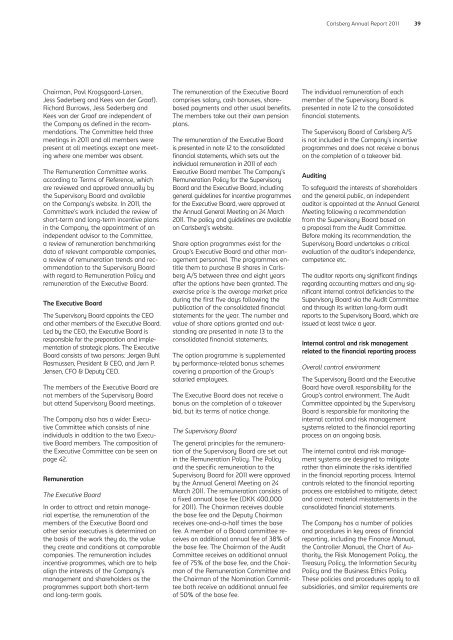
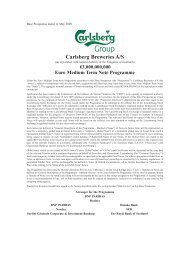
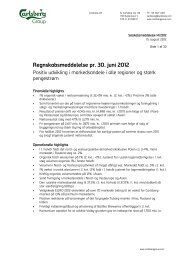
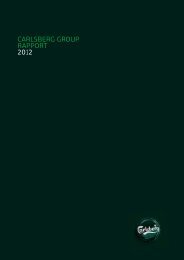
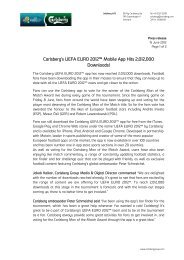
![[Name and Address] - Carlsberg Group](https://img.yumpu.com/49766377/1/184x260/name-and-address-carlsberg-group.jpg?quality=85)

![[Name and Address] - Carlsberg Group](https://img.yumpu.com/49015962/1/184x260/name-and-address-carlsberg-group.jpg?quality=85)
